#And ramses surviving at the end? What was that?
Explore tagged Tumblr posts
Text
okay. Just watched Prince of Egypt for the first time. Sorry! I know, uncultured.
I am…having thoughts. Namely, why is this movie so praised? And on tumblr of all places?
interesting? Sure. Pacing? Fairly decent. Complex characters? Yeah. Two of them. Accurate to the original material? Only in its most basic form.
Regardless of my own feelings about the movie, I can’t believe that TUMBLR of all places has no issue with the serious erasure of women and disabilities in that movie! It took away Jochebed/Yokeved’s really significant role of raising Moses, teaching him about his people, making sure he didn’t forget who he was—which was only possible because of Miriam’s courage and cunning!
and the worst offender, of course, is the complete erasure of Moses’ speech impediment and Aaron’s role in helping him communicate despite it. The whole storyline of being disqualified from rule in Egypt because of it, and the God of the Hebrews saying, no, I made you just the way you are and I’m going to show them and you how perfect you are is just…thrown out? For some basic brotherly angst?
idk. It just. It wasn’t what I was expecting.
#And ramses surviving at the end? What was that?#prince of egypt#the prince of egypt#moses#aaron#Ramses#disability representation
3 notes
·
View notes
Text
I am just obsessed with the recurring themes of our lives as stories in the Junoverse.
Alessandra Strong reminding us that there are no Happy Endings in real life, only Happy Middles.
Juno being reminded that stories are a way humans have of trying to frame our lives in a way that makes sense, but real life is not that simple. In the reminder that you might want to become the villain in a story to make sense of it but maybe sometimes little kids who live in Oldtown die and no matter how much you blame yourself, it is just not that simple.
In the way Sarah Steel got her story stolen away from her. Andromeda's story, yes, but also her story. And how she couldn't deal with that.
How Juno tried to rebuild a story to survive, with him as a hero as much as he was embarrassed to admit it. And with the part of Sarah Steel pumping through his veins as the ultimate enemy. An epic of heroes and monsters. The way his life was not a simple story in which there was One Clue that would explain everything, One Answer from Ben that would make sense of it all.
The way Juno got robbed of his story by Ramses. Made all those sacrifices, those actions that felt heavy on his shoulders for a plotline that didn't exist. The plot twist was the unraveling of the story, leaving only pain and sadness behind. The way Juno was able to overcome that. To start a new story, to do with his life as he saw fit.
I also love the reminder that we do need stories like Mick's to keep us hopeful. To gather strength to face the big mean world. The acceptance of how useful and sacred the tool of "stories" is.
The way dreams - stories- like having a life of adventure among the stars with the one you love, or like having a home in a city that means death but also hope to you… that those are also necessary. But we can't live in a dream. And the dreams may pass, but it's okay that we dreamed them.
The way Juno could recognize the brutality of stealing Nureyev's story away from the thief. The cruelness of it. How he could sense it coming, looming from that door. How afraid he was for Nureyev.
The way Nureyev's only way of coping all these years has been telling himself a story over and over again. A story of martyrdom. A story of devotion… In order to keep Juno away and not succumb to the desperation to be next to someone he loves and feels like he doesn't deserve, he has been telling himself this story. This lie of how Juno would be better off away from him. How Juno would never understand the sacredness of his life's work.
All these stories, all these versions of what's going on… All these precious lives being used as little clogs of an infernal machine that does not care for stories. Only results and getting richer and richer…
Just ugh… this podcast…
#tpp#the penumbra podcast#the penumbra podcast spoilers#tpp spoilers#tpp season 5#tpp s5 spoilers#tpp season 5 spoilers#just me rambling again#im just so normal about this#juno steel#junoverse#peter nureyev#benzaiten steel#sarah steel
126 notes
·
View notes
Text
Considering Heitor again, despite her brief appearance, her one instance was actually rather bleak and depressing.
Peitha: Why are you hunting us? Only fear dangles from your flesh... Heitor: You... (snarls) Heitor: You haven't been to the castle in some time, have you? You ran. And hid. You still run.
Peitha had seemingly been in Zakiros for the entirety of base SotO, and even was with Eparch for at least part of it, all the way up until she decided to intervene in Cerus's attack on the Commander right at the end.
And Heitor's words implying that, while things were already awful for even nobles in Zakiros (Eparch likely setting them all against each other just so that he can maintain none of them gain more power than him specifically), they became considerably worse after Peitha left.
At the same time Heitor lost Cerus, her mate. One of the strongest kryptis in Nayos.
It´s not enough that she lost her partner, but she would have lost a lot of power in their society through his death. Safety and security, because I cannot imagine many, if any, kryptis would want to try and take on or anger someone known to be as brutal as Cerus.
And as Ramses theorises, Eparch sets Heitor's own underling as essentially a babysitter to her, while Ignaxious' own dialogue leans towards him having no real respect for her and just seeing her as a means to an end for Eparch's favour.
She is someone who struggles to retain respect and is not even properly trusted by Eparch, and that thought would be terrifying to consider given the society that they live in. It's rather haunting to imagine just how much worse her life certainly became in the time after Cerus's death and up to her own.
Peitha: You didn't have to do this. We can go another way. Heitor: Of course I did, Cousin. If not them, then us.
It's possible that Heitor's line, given what we know of her experiences and position in Nayos, that she knows there would be hell to pay for herself if she does not obey. Discomfortingly, it could imply that she is just as easily viewed as 'sustenance' if she fails to do her job correctly. 'If we do not deal with disobedient civilians, then we are the one who pay', etc.
<Character name>: I'm sorry, Peitha... Are you okay? Peitha: Save that sentiment for your own. Heitor wanted to die. Peitha: And she likely escaped a much more miserable existence.
Peitha was rather shaken up by having to kill Heitor despite her claims to the contrary; implying through one line that she would have wanted Heitor to join them. She cared about her, in some way. So perhaps when she says Heitor wanted to die, she genuinely meant it, knowing everything she lost and everything she must have suffered in the aftermath.
Heitor was unmistakably as cruel as any under Eparch's command, but in a way I think she was much like Cerus; both gave in to the shows of power and brutality they saw, and realised they had no other options if they wanted to survive. Like Cerus's loyalties to Eparch seemed to be born from the traumatic experience he suffered in the Temple of Febe, Heitor's was born from fear of what could, and would, happen to her if she did not do whatever she had to.
I think if Cerus had been able to be convinced by the Commander and Peitha to join their cause, then Heitor would have followed him with no question.
#text#soto spoilers#heitor#i feel like she can be the most overlooked in the kryptis royal family but :'(#i mean i can never forgive what happened with Irja because that was just beyond cruel and Irja deserved better#but damn if she wasnt also a victim of eparch's tyranny TT_TT#kind of also became sort of a look at how her relationship was w/ cerus#its kinda disjointed but w/e
30 notes
·
View notes
Text
Cannot stop thinking about the relationship between Peitha and Heitor. Peitha is insistent on getting her to join her side, yet when Arina tells her it won't work she says she knows. Yet even when we finally confront Heitor, Peitha attempts to reason with her, get her to join her in this rebellion. Yet Heitor refuses and attacks. And after she's dead Peitha talks about how there is a world where she joined her, where Heitor stood by her side.
Ramses tells us that Peitha and Heitor grew up together, that they fought together, survived together. He also tells us how, while Peitha doesn't show it, every death piles on her shoulders.
When you leave the tower and talk to her she tells you how her mind if far from clear. And when you stop to think of it Peitha could very much feel alone in her rebellion. Her brothers are dead, she knew they would never join her, but maybe there is a world where they were better, where they resisted Eparch as she did and joined her. But that's not this world, and they were never close to her. But Heitor? Heitor was.
Peitha knows they need strong people to help them with this war, and Peitha knew Heitor was strong, And Heitor knew Peitha was strong. They both knew they could survive. Peitha knows that she's strong enough to do what her mentor couldn't, Peitha isn't afraid to stand against Eparch, but Heitor was and that was her downfall. Peitha tells us that she could see that Heitor died afraid, that we did her a service in the end.
Peitha is alone, no one from her life before this rebellion is with her. Her mentor is dead, we hear from her how she wasn't strong enough then to save him, but how now she is and how she thinks about a world where she could have saved him. Peitha talks of the different realities she's seen in the mists, how often does she think about the different realities where things went her way, where she wasn't so alone in this?
This is the shit that eats me up and for as short as the new chapter was it's left me with so much to think about with Peitha's character.
#gw2#guild wars 2#peitha#soto spoilers#gw2 peitha#this shit has been sitting in my drafts why the hell did i not publish it#this is still eating me up btw
42 notes
·
View notes
Text
Iris
Honestly, I constantly forget Iris exists but I was just writing a chapter with her and remembered she’s one of my favorite OCs.
Iris is a lady so she has a lot of power in the social system, but she’s very far down the line of succession. Unlike Daron, who is supposed to be the perfect image of a lady, Iris is very mischievous. She’s also lowkey a pirate, but we don’t learn that until much later.
Iris has one of my favorite designs, partially because she looks similar to me, but I also had a lot of fun with her look. She has dark brown skin and waist-length twists. She has orange eyes and red runes tattoed up her arms and across her chest.
Iris’ clan is very important to her character. The Arsonite Clan is the only clan that originated outside the mainland, so they have a different culture than the other clans. The Aquatic Clan stole their land, which started a war between all of the clans. After the war, the Arsonites were left with no land, money, or allies, and their language was on the cusp of death because they had to assimilate. Iris is very involved in her culture. She’s fluent in Arsonean and is experienced in their traditional dance.
The Arsonite Clan being left with nothing is how they ended up as pirates. They sink human ships despite the fact that humans and witches are not supposed to interact at all, and keep the spoils. When their betrayal is discovered, Iris shows absolutely no remorse. She stands by what they did to survive (as she should). I honestly want to write a spin-off of Iris’ pirate adventures when I’m done with the main story.
Iris has had a lot of development since the first draft. I didn’t know how to characterize her mischievousness, so she ended up coming off as tone-deaf and kind of annoying. In my second draft, there’s more of a balance between her causing chaos and her tenderness. I think it’s perfectly summarized when Daron asks her for a favor and Iris asks what Daron will do in return. Daron knows that Iris would help unconditionally and just wanted to stir the pot.
Fun fact: Iris was originally named Aralea after a classmate I had in second grade. Upon further thought, I realized that was too similar to Ariella—Aria’s full name—so I changed it to Iris, a goddess a learned about at a Ramses exhibit.
Spiritwalker taglist: @the-golden-comet @pixies-love-envy
#spiritwalker wip#writeblr#writers on tumblr#wip#my writing#original character#my ocs#writers thoughts#creative writing#writing characters#writing fantasy#fantasy#writerslife#writing process#black writers
8 notes
·
View notes
Text
@hembralfa said (inbox):
you need to wait! his majesty is busy! without an ounce of care for the one telling her to halt, loni barges into the king's quarters. it doesn't faze her, not one ounce, as to whatever was going on. "IS IT TRUE?" her sources couldn't be right, could they? leanne was mobilizing her army, and for what? to come after ramses and his kingdom? all because of that incident with her? "fuck!" she doesn't need him to reply. she already knows the answer.
hands rake through hair as she paces back and forth with the gusto of a wild animal stuck in a cage. "I knew this would fucking happen! I knew it!" she played around too long and now things were no longer going according to plan. "we aren't ready yet, but... but...!" in her frenzy she has a single moment of clarity. in that instance she stops and looks him directly in the eye. "I quit." she didn't think it would end like this, but if it means keeping him safe and his people it was well worth it. she'd be able to get word back to leanne that she'd left. she'd give them a trail to follow. while she did that she'd tell ivan to gather up their forces. it was time to take york back. "goodbye ramses. maybe one day we'll meet again, and if we do... I hope you'll forgive me for all the secrets I kept from you. please just know... I never meant to hurt you. I-..." she pauses and bites her lip. "tch."
before she could say anymore she turned and bolted. I need to leave now. if I say anymore I might waver, and I refuse to give up on my dream. soon she found herself in the stable after having gotten her gear and gathered her wolves. with one final glance as they took off she felt her eyes heat and her throat tighten. "falling in love was never what I wanted... such a fool I was. be safe, my dear king. my only hope is that I can face you in the way you deserve should I survive this..."

TEARING HIS GAZE AWAY from the letter in his hand, he frowned as his gaze came to linger upon his closed door. What in the world was all that racket? Curious, he was half-tempted to make his way over and take a peek, but that thought evaporated as soon as it appeared when his door was promptly thrown open without so much as a warning. ❝I can see your manners are atrocious today,❞ he replied with a near lazy drawl, his golden eyes shifting back to what he had been reading without so much as skipping a beat. Ah…it had only been a matter of time before word of all this made its way back to Loni. He had tried to keep her from getting too involved in this mess – primarily because it seemed to distress her a great deal. Such was understandable, though, considering her being here in his kingdom, in his palace was what caused the commotion to begin with. At first, he could not comprehend why a queen in another nation would make such a big deal out of capturing one mercenary…but in time, he came to realize that there was more behind his favored mercenary than met the eye.
Far more.
Letter finally placed to the side, it was then that he was able to put his full attention on her. ❝You need not blame yourself for anything. That queen has no idea how to properly rule.❞ She was playing some thug rather than someone with finesse in politics, and so it was a small wonder to him she hadn’t stepped on another’s toes while throwing her weight around as if she knew how this ‘game’ all worked far better than those immersed in it. ❝Actually, there is something I wished to…❞ His words cut off instantly at what was said, his mouth partially open, and eyes widened with unhindered surprise. ❝You…w-what?❞ Did she just proclaim that she quit? Just like that? And without warning? Well…this was…not planned. He knew that it was a possibility; however, he hadn’t expected things to just up and end like this. It all threw him for a loop and left his mind reeling; synapses stuttering as if trying to find ways to figure out this bizarre string of words she had uttered without pause.
❝Loni---❞ Nothing he planned on saying met her ears, for the ‘wolf’ mercenary had already fled the scene with such speed that one would almost think she had committed a crime. Silence was all that was left in her wake before a guard stood in the doorway with hand upon their chest, quickly and profusely uttering their apologies for all that had transpired under their watch. He heard them but didn’t really listen to anything that left their mouth. It was hard to do so considering all that had just happened in a span of a what felt like a few seconds. ❝I already knew everything…❞
#hembralfa#[FINALLY I CAN REPLY TO THIS#MMMMMMMMMMMMMMMMMMMM]#;v: ???#;;au (fantasy)#answered#;;inbox#;post: beta
3 notes
·
View notes
Note
"You will die with this endeavour Ramses."
Ramses paused, turning to look at his little brother. The sands of their homes whipping around them.
"And? Have you forgotten how our world works? If the end goal is me as Hierophant than that is enough."
Osiris clenched his fists, turning to look at the Bone Palace. This can't be the way, this can't be the only way.
Sarai had taken them in, had vowed to their mother to protect them. But even she couldn't keep them from their homeland. He wondered if half the reason Ramses had thrown himself into this was to escape Hallariel.
But if he knew anything being a ward of that family - they were relentless for those they loved. He swallowed, following his brother tentatively.
"Sarai wouldn't want you to -"
Ramses spun, slamming his fist into his eye. He gripped him by the collar, dragging him closer. His eyes burning, the winds spiraling higher aorund them.
"Sarai is not our blood. Sarai is not our mother. Sarai is not of us kind. You've been spending time with that Sheildmaiden brother. You've grown soft."
He tisked, shoving him back into the sands. Osiris barred his teeth, trapping the fear down.
No.
Never. He'd never show it to him.
"Audra has nothing to do with this! You'll die going against them!"
"Then I die. When has death scared either of us?"
Ramses crossed his arms, staring him down. They weren't in the halls on Terresan. They weren't in the barracks of Doranelle either.
This was their homeland and no rule would save Osiris now.
Not was their way.
"Are you with me or not?"
Osiris swallowed and slowly shook his head.
"I'm not. I will not die....I will not leave her."
Ramses lunged for him, his hands squeezing his throat.
------
Osiris caught Hallarial's wrist, focusing his gaze on the only mother he had ever known or remembered.
"Please - please don't hate Ramses. Hea desperate to prove his worth to our father, to our people."
They'd never follow a Heriophant in the pockets of a Godtouched family. Audra paced by the window, barring her teeth at Osiris.
"You barely survived his assault and you still defend him? He should have his hands cut for -"
//all I know is their mother fought with Sarai, and slowly became her friend. When she die she begged Sarai to take her sons to a softer life//
How could she hate one who just wanted to follow his path? Who wanted to show that their mother’s death had not been in vein. Their father was within his right to be harder, to be weathered by the world he had been left behind in. Losing your mate, she could only imagine the female she would become should Zimri one day leave the plain of the living.
Though her hate and rage was probably not the one they should be concerned for, her gaze lingered on her daughter as she rested her hands within her lap. Her sweet daughter who’s venom was like her own, whose emotions were pliable and fresh without the years of pain and war.
Hallarial was reeling though her own hurt, the feeling of betrayal. She had grown close to Ramses, she had seen the look of longing she had often passed his way.
“He is doing what any male in his position should do,” she spoke up, looking towards Audra briefly before she looked back to Osiris. “I will never hate him, he is doing what he must. He knows his calling, he feels the pull. I just hope that he remembered that even following that call, there are things he will want that he can’t ignore.”
She watched her daughter tense. How she wished their mother was there, they would enjoy this dalliance of romance and she was sure they would bet on how long until Hallarial and Ramses finally gave into the bond. She cherished the memory of finding out they were fated, for it meant she kept a piece of her friend in her life a bit longer.
“I also hope we all remember that we must follow our own paths, even if it isn’t where we are right now…”
0 notes
Note
Sorry, I don’t know anything about Egyptology? What did Ramses II do?
Being a little bitch about a lot of things. To be fair most his actions weren't really out of the ordinary for an Egyptian ruler, but he lived for so long that he could do SO MANY of them so it just stacks. A few choice acts:
Appropriated buildings, monuments and even reliefs from his predecessors, including his own father, cut their names out and carved his own in.
Carved his name so deep, in fact, that birds could nest in it. Yknow, to keep his successors from doing the same to him.
Couldn't win the battle of Kadesh.
Twice.
Still lied about it and said he had actually, honestly, cross his heart and swear on his dad's mummy, won it - singlehandedly at that! (Again this is pretty normal behaviour for an Egyptian ruler but he was such an insufferable fucknugget about it.)
In the aftermath of this wrote up a peace treaty with the Hittites, got two princesses for his trouble, and in the dowry negotiations asked for quite frankly exorbitant amounts of dowry, leading mother of said princesses, Puduhepa, to write him letters that basically read "bitch? The fuck??"
Had an exorbitant amount of wives and an even more ridiculous number of offspring because he was terrified of ending up with no heir.
Ironically then lived for such a fuckass long time that he actually survived many of his prospective heirs, to the point where his thirteenth son Merenptah ascended the throne in his fucking seventies. In so doing, Ramses threw the line of succession in such disarray that we could actually blame the eventual fall of the New Kingdom on his refusal to die.
6K notes
·
View notes
Text
Track A-5
"No, Jirachi is not an Ultra Beast. It comes from space, not Ultra Space. There is a difference."
Emmet gave up understanding the difference between space and Ultra Space at least half an hour ago. Space was space. What was next? Mega space? Great space? Premiere space? Luxury space? Oh, he liked the sound of that one!
Cameron lightly nudged his boss, trying to make him focus. He was also having some trouble absorbing all of the new information they were being given, but at least Cameron was trying. Someone in this room had to be listening to all of this. Cameron knew it must be relevant to the current case, and did his best.
Cloud raised his hand for the fourth time in the last ten minutes.
"Hoopa?"
"Hoopa cannot travel through time," responded one of the international police agents, "If he were only spatially relocated, then Hoopa could have been a possibility." These poor officers were instructed to explain the circumstances to the Gear Station agents, so that they'd understand what possibly happened to their unfortunate boss.
Only Jackie realized it would be smart to take notes, and for the exact wrong reason- The best scary stories are the ones that are accurate and thus feasible! But at least someone was writing this down.
Cloud continued suggesting various legendary and mythical Pokemon, and continued being shot down. Very few of them are able to interact with Ultra Space, and even less actively do so. But he was getting info about legendaries, so he still won in the end. Even if he was still starving, he'd definitely won this interaction.
"So far we got Celebi and Hoopa being jerks together, the Sinnoh dragons, a real big Girafarig, the Unown, and now space beasts?" Jackie asked, checking over his notes.
"Ultra Beasts," an officer yet again corrected. "Pokemon from space like Deoxys are incapable of such a feat. Unown are not legendary, but are still unlikely. They very rarely leave their own dimensions." After a moment of thinking, they added "Most Ultra Beasts are also not capable of causing this by themselves. We are still working with the Aether Foundation to decide if Necrozma or Cosmog are or aren't Ultra Beasts."
Yuuuuuuuuuup. Emmet was still verrrrrrrrrry lost.
The Depot Agents weren't fairing well with the sudden influx of unknown information, either. Ramses and Josh were both horrified by it all, and had mutually decided that clinging to Furze was a valid idea. Isadore had given up in the first ten minutes and left to take a nap. Hank was still trying to process the idea that Pokemon could come from space. Only Jackie and Cloud survived the infodumping.
"New question!" Jackie shouted, raising his hand, "Do we have any idea where or when Ingo could've ended up?"
Finally someone asked it.
"Not yet," replied an officer, "But it's entirely possible that he's already been ki-"
"SO ANYWAY!" Furze suddenly interrupted, throwing his hand up, "There were no Ultra Wormhole traces in the Gear Station, right?"
Emmet's smile faltered. What was the officer going to say? Furze never interrupted people unless it was an emergency, he knew that. So was something wrong? Already been what? The gears in his head weren't turning as fast as he'd like them to be.
He was so deep in thought that he missed the following explanation. Emmet would need to be told later about the lack of Ultra Wormhole traces anywhere in the city, and how odd the situation was as a whole. Emmet only tuned back in because he felt someone staring at him, that being Cameron doing a concern. Emmet gave him a blank smile in response, not sure what Cameron was worried about. What'd he miss? Damn. Maybe he should have taken notes like Jackie. Oh, but then they'd be covered in little Joltiks and Archens instead of actual notes. Speaking of Joltik, he could feel a few of them traversing the inside of his coat sleeves. He had to resist the urge to immediately pull them out and place them on the Agents, this definitely not being the time nor place for that.
"I've got something important to add," said an officer, their voice piercing straight through the off-track thoughts Emmet was having. Emmet immediately looked up at the officers expectantly, maybe staring a little too hard.
"Most missing persons cases of this caliber get solved, so please do not fret. We're on it, and we already have ideas of where to start."
The Subway Boss and all of his Agents exchanged looks before Emmet's smile returned in full force. What a relief! They were going to find Ingo! How verrrrrrrrrrry exciting! So exciting that he'd started bouncing and stimming with an excessive amount of force. A spare Joltik got flung out of his sleeve at Mach 4.
Cloud shifted forward to lean around Furze so he could look at Emmet. "Well, you know! Unlike what Jackie likes to think, Time always gets fixed in the end!"
#emmet#subway bosses#submas#depot agent ocs#writing tag#BROTHER LOOK HOW HARD I CAN STIM! is responsible for me finishing this one off#Track System#pl:a spoilers
55 notes
·
View notes
Text
okay but part of what i love most about juno’s character is that despite what he wants us to believe, he’s just so clearly not a pessimist. no matter how hard he tries to cultivate this jaded, cynical exterior, beneath it all he literally just cannot force himself to give up on the idea that people are capable of just as much good as they are evil. and, no matter how deeply he’s tried to bury it, that little shred of hope that maybe humanity is worth saving is what keeps him going day after day. and we see him demonstrate this countless times throughout the series: with nureyev, wire, ramses, even buddy and the carte blanche crew...even when all of his survival instincts are screaming that something is too good to be true— and even when they’re right, —he can’t bear to let go of that little bit of hope without a fight. as jaded as he wants to be; as many cynical quips and jokes as he tosses out for his audience, he chooses to trust again and again and he chooses to keep fighting again and again. because at the end of the day, that’s who juno steel is: someone who, be it by anger or hope or sheer fucking spite, chose to keep living. because whether he likes it or not, he can’t shake the feeling that there’s enough good in the world to make it worth fighting for. and maybe that makes him wrong or stupid or naive, but keeping that shred of hope alive in a world like this one is the hardest thing there is. and i love him for it.
#juno steel my beloved#i am so proud of him pls#juno steel#junoverse#tpp#penumbra#the penumbra podcast#penumbra podcast#jupeter#ramses o'flaherty suck my dick#stinky lil rat man#i hope he is having a very bad day#hyperion city
371 notes
·
View notes
Text
Story Structure and Independent Media: Why the Juno Steel finale absolutely fucks (but you might have been disappointed)
The season finale of Juno Steel dropped Thursday (Spoilers ahead). Tl;dr, I loved it. The emotional payoff of Juno’s continued growth, his sense of family, and the entire crew’s faith in each other was satisfying both as a fan and as a writer. So often, a story may technically answer the questions raised at the beginning, but fails to emotionally satisfy.
Penumbra did the opposite of that.
We have SO MANY unresolved questions right now, some of which have been hanging around since the beginning of the season, and we got very few answers. We have several villains, none of whom have been defeated. If we were listening to this story as unemotional analysts, it would feel unfinished. It IS unfinished. But Juno has had a very important emotional epiphany, and that’s what Penumbra lives and dies by. Each season finale (and the season 2 midpoint, which really was a finale in its own right) have been about Juno’s emotional change as much or more than defeating the villain. It was less noticeable before, because we also had Miasma, Pilot, and Ramses to present as classic villains.
But here we are at the end of season 3, and Peter is missing, the crew is captured, and Juno is alone. We don’t know if we can trust Sasha, we know we can’t trust Dark Matters, and Peter’s creditors loom.
If I were to analyze this from a plot perspective, this isn’t a finale. It’s the dark night of the soul. It’s the moment when all is lost, 75% of the way through the story. We should have had 1-2 more episodes where Juno executes a daring rescue, pays Peter’s debts, and they kiss as the sun sets.
Here’s the thing: the Penumbra doesn’t have to do that! The Penumbra is not beholden to anyone except their patrons, and their seasons are organized by emotional arc. That’s why season 2, which was 2 seasons in length and complexity, was a single season: because it followed Juno’s emotional arc cohesively. He had a massive change in the middle (”fuck you blood chair, I want to live”) and spent the second half of the season learning to make good on that decision and how living is different from surviving. Like I mentioned above, that emotional arc matched up well with all the Ramses shit, which is how most stories are structured. The internal arc and the external arc are perfectly twined together, and one helps resolve the other. Because the Penumbra isn’t running on a network or constrained by a publishing house, they know they will have as much time as they need to resolve all the problems they have hinted at.
So to analyze season 3 from the perspective of the emotional arc, what we got is exactly what we’ve been building to. This season took a huge risk by adding rotating narrators. One the one hand, I loved it, because every Penumbra character is vibrant and interesting and the character voices are incredible. But it was a little harder to follow, because it wasn’t Juno’s story anymore, and it wasn’t about his depression. He was still depressed—a hot boyfriend and a loving family won’t cure that. But he was learning self care, and the depression wasn’t controlling his every decision anymore. Instead, the emotional arc was about the whole crew learning to trust each other.
Each episode strengthened at least one interpersonal bond, and over and over we hear references to family movie nights and family meetings and Buddy’s enforced bonding. WLB was the culmination of that, as Juno trusted each family member to pick up his clues and plan an escape—and then when that failed, Jet put all his faith in Juno and sent him off to be a one-lady rescue team. They are separated, but they are still family.
We still have the problem of Nureyev, but his failure to bond has been an issue mentioned in every episode. He’s the puzzle piece that refuses to fit into the board. It hurts and I hate it, because I love and trust Nureyev and just want him to live a happy, debt free life watching streams with Rita and being dramatic about how strong and sexy Juno is.
It’s unsatisfying because we love Nureyev, and because it goes against the central thesis of the season.
But, I repeat, the Penumbra doesn’t have to wrap everything up at the same time! They’re playing a long game. Season 3 is over, because Juno has a family. I don’t know what Season 4 will bring (I know better than to make guesses about what Kevin and Sophie are planning), but I know it will be a new emotional arc, and I know it will involve Peter. I hope we get his POV. I’m certain he will finally become part of the family and learn to be vulnerable. Somehow, the whole family will be together again. Because that’s the second half of this arc from a plot perspective. Whatever happens in Season 4 could arguably be considered part of Season 3, but we’re getting some breathing room, and probably switching up the format and focus, and whatever happens, I’m looking forward to it.
PS: If you enjoyed this, I wrote an essay on my patreon about story structure from a broader perspective. It’s free for everyone, but if you find it interesting, please subscribe for more free essays!
453 notes
·
View notes
Text
roark's expertise with fossils in particular has much to do with the fact he is a trainer before he's a researcher—oreburgh museum's staff are versed in handling rock types and fossils alike, but from a more academic perspective, that is, what habitat is best for them, an optimal diet, enrichment activities, data collection, overall health, all things that are more or less objectively required for a fossil to survive. the staff are incredibly versed in their education and research, but that doesn't particularly lend them much time to handle much else.
that's where roark comes in, who handles a lot of the social and mental aspects of handling fossils, aside from training. allowing them to actually thrive in the modern age is essentially what both him and his father specialize in, especially seeing as he's essentially grown up exclusively with them. roark focuses on their quality of life, especially since he will often train fossils freshly revived through the oreburgh gym. with that, he's also responsible taking care of their physical form as well. modern society isn't particularly made for 'mons of 100 million years ago, and with that, roark has become somewhat of a fossil veterinarian. he does this often with ramses and other bipedal fossils primarily, but roark manhandling dinosaurs to give them a hip adjustment is a frequent occasion—he's essentially become a glorified reptile chiropractor and masseuse.
aside from the pain relief and making sure the young ones grow properly lest there's deformities, there isn't much he can do about the fact fossils really aren't meant for concrete and urban areas aside from taking proper care of them on a weekly basis. he does love this aspect of his job at the museum immensely though, seeing for his love of rock types is rigid as ever—developing a strong and loving bond and in the process, teaching fossils how to interact with humans ( their future partners in either battle or contests or just daily life!! ) is purely rewarding in his eyes. he strives to make sure that anyone who wants to raise a fossil will have everything at their disposal to give it the best life possible. fossils themselves do not have the longest lifespans despite their typings often being rocks, but given their original ecosystems being both incredibly dangerous but apt to fit their evolution, the few decades some of them likely lived to has since been halved ( by the his guess, anyway ) being introduced into a modern society through restoration. even the shieldon that naturally hatch on iron island under byron's supervision do not have the longest of life expectancies, even with their steel typing. from what the rock family understands though, they suspect bastiodon live about twice as long as rampardos ( which means ramses is heading into the last third of his life, and bastiodon herself is already basically a happy senior lady ). it would take several generations to really see any difference, but iron island itself is one of the few regions in sinnoh that are the closest to being to their natural habitat.
nonetheless, roark does his part in making the transition to the present age as smooth as possible, even going as far to teach interested parties how to best adjust to having a fossil as part of their home. those who approach him at the gym may often receive an excessive amount of training advice and a showcase about the kind of potential fossils offer, especially since there are no shortage of fossils being used in the competitive scene. roark ends up being quite the point of contact for more practical advice if he's not caught in the museum itself ( he's also just immensely more easier to get a hold of than his dad when he moved permanently out of oreburgh ), but he doesn't mind at all. in fact, he welcomes it! genuine interest makes him incredibly happy, especially when it's potential forever homes. that isn't to say the museum pumps out revived fossils by the tens or hundreds, however—in the lucky event a fossil is even discovered at all, there's also the complicated process of extracting it in the state it was found in, and then the inspection to see if there's enough of a specimen available to restore the rest of it. but, with roark's dedication ( mental illness ), some months have seen a surplus in little guys running around. roark often fosters a few at a time at home to acclimate them, with ramses as their first social contact that's familiar, then aerodactyl. the house in oreburgh has enough land for baby fossils to get used to their surroundings safely. roark's own team is involved with keeping an eye on them if he's not able to, but it's a rather lively and fun process. come bother him once in awhile and he might have a foster or three!!
#🗻 ━ 𝗍𝗁𝖺𝗍'𝗌 𝗐𝗁𝗒 𝗍𝗁𝖾𝗒 𝖼𝖺𝗅𝗅 𝗆𝖾 𝖺 𝗋𝗈𝖼𝗄. / roark hc.#this got out of hand fast.#but on the plus side roark really gives the best shoulder rubs bc of this. yay.
7 notes
·
View notes
Text
REVIEW, Part 1: The Prince of Egypt (1998)
Disclaimer: This was written in April of 2021, but couldn't continue due to Tumblr's image limit. They only allowed 10 per post, but now it's 30! Still too little for my review though, so I need to do this in parts. Link for Part 2 is placed at the end of this post.
I saw one of Josh Keefe's video here on Tumblr. It looked promising so I got curious and watched it. That led me to his other videos, and I came across his video essay for The Prince of Egypt. I’ll put the link here so you could check it out.
I’ve always loved this movie. Due to some films and series I’ve seen the past couple of months, I have this new way of appreciating filmmaking. Since it’s on Netflix and it’s holy week anyway, I decided to watch it again.
The movie opens with this:


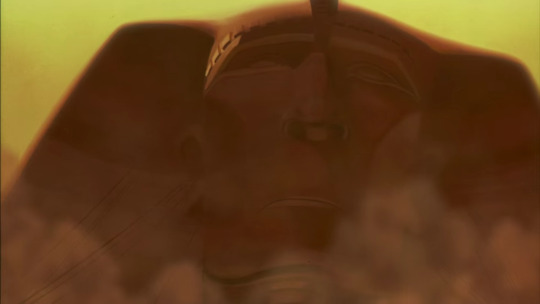
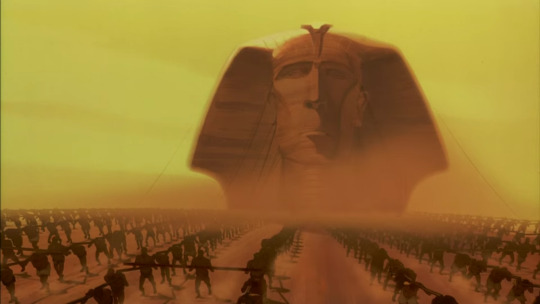
We see clouds in the sky. The clouds go away gradually to show the sun. Suddenly, Pharaoh's big statue head drops in the shot. The symbolisms here and how they're shown are remarkable. In ancient Egyptian religion, Ra is god of the sun and creator god, and it was thought that Pharaohs are depiction of Ra. When the people, the Hebrews, are revealed to be pulling this huge block of stone, we immediately see slavery and how the ruler of Egypt is making their lives miserable.
Under the heat of the sun, which I think is also a symbolism of how the Pharaoh is above the Israelites, we hear the Israelites' prayer to God. We'll see more of how Egyptians are always above the Hebrews.
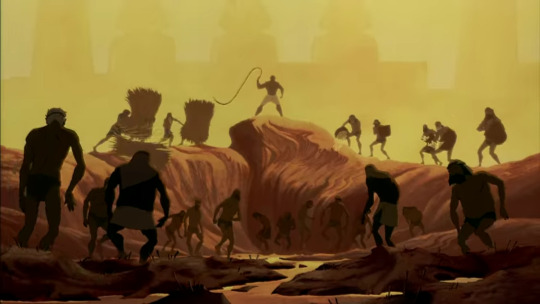
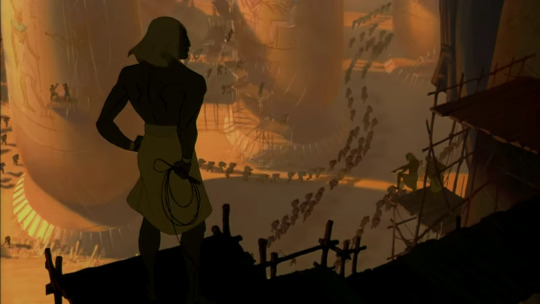
This particular scene where the Egyptian guard cuts in exactly right after showing Pharaoh's statue head is brilliant.
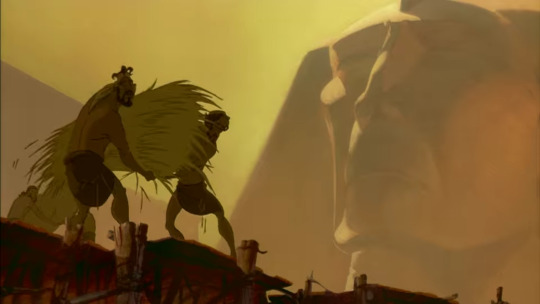
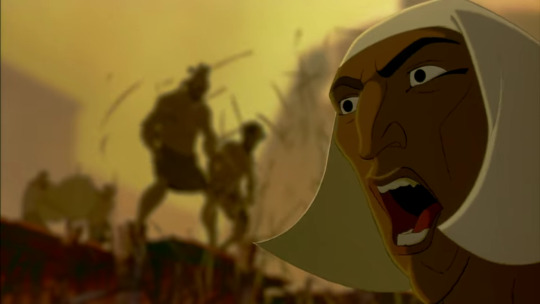
By the end of the song, a woman is shown holding a baby. Egyptian guards are running in the background, while the woman is singing,
“Son, I have nothing I can give but this chance that you may live.”
According to the Bible, there was a directive from the king to throw every newborn Hebrew boy into the river. Then, the scene changed into a reddish hue.
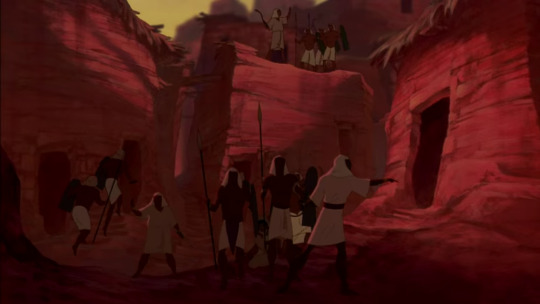
Jochebed, Moses’ mother, threw him off the river. Even with his sister Miriam watching over him, whatever happens to Moses now is beyond their control. There’s no assurance that he would survive. What are the odds that the Egyptian princess would find him? What are the odds that she’s not as evil as her people? What are the odds that she would accept a random Hebrew baby in the royal family? Jochebed’s faith challenging the odds should be lauded, and the goodness of the Egyptian princess should be recognized, too. Women!
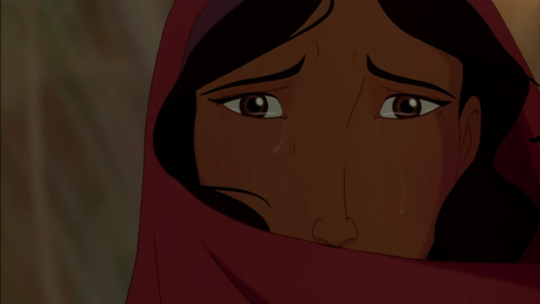
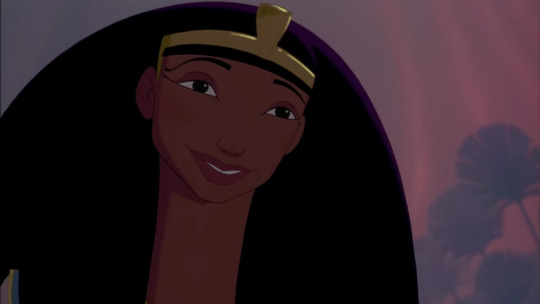
Moses, now in the arms of princess, is carried into the palace.
Pay attention to the lyrics of the song in this scene.
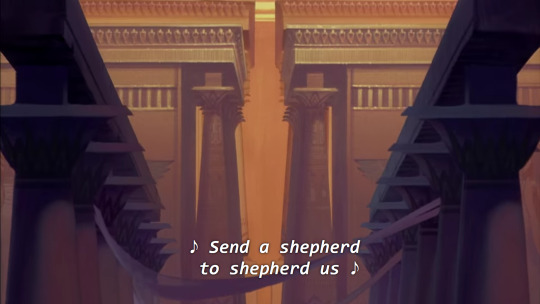
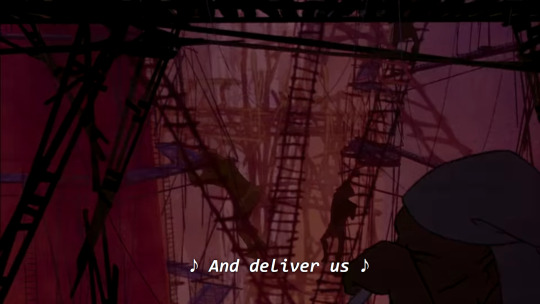
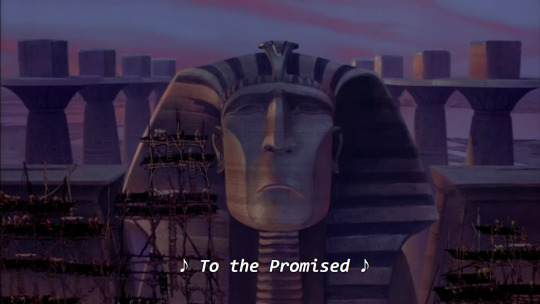
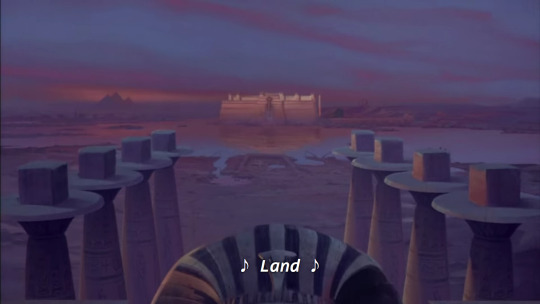
Next, we see Ramses and Moses, all grown up, riding a horse carriage. There are hieroglyphs around them, but they seem undisturbed by it.
Ramses takes a good look at that one particular hieroglyph where an Egyptian is also riding a horse carriage. He's pleased, as if saying to himself that he’s on the right track. Moses saw this, and tried to joke about it, but Ramses answered candidly.
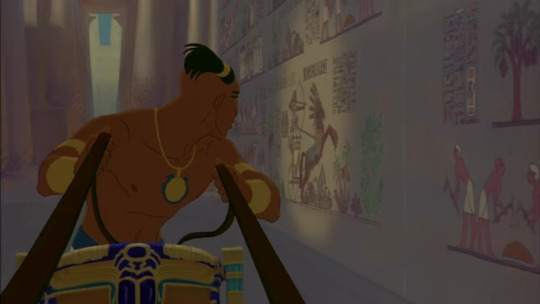
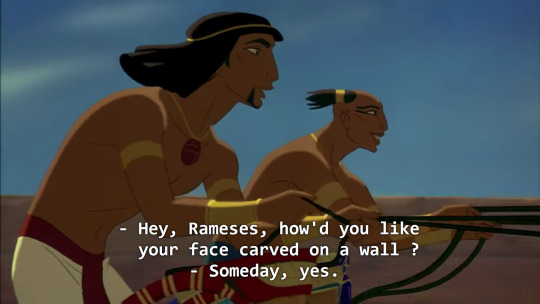
The brothers are reprimanded for the ruckus they caused that day. Consider the spaces and lines that separate the characters, the Pharaoh from his sons, particularly Ramses.
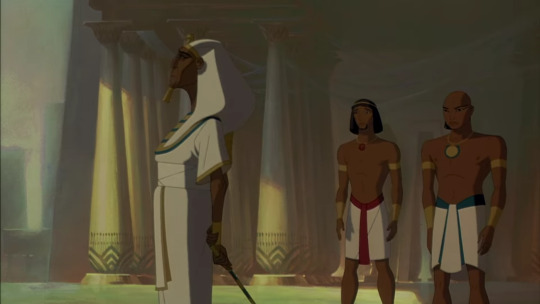
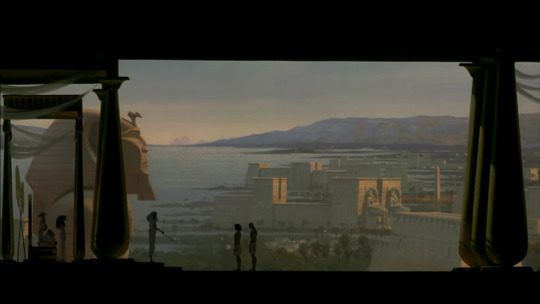
The second still above in particular, is right after Pharaoh saying, “I’m building an empire.” In the background is the view of the land, and on the king’s side, his statue head overlooking the city.
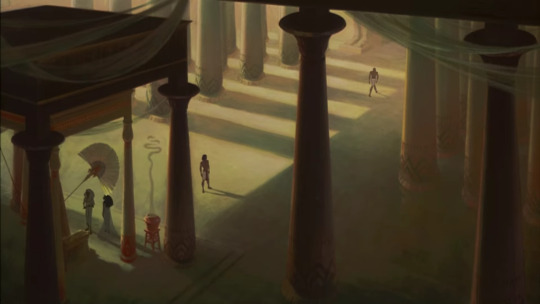
After Ramses left the throne room, Moses pleaded their case to the Pharaoh. Again, be aware of the spaces. They’re now partitioned separately, but notice that Moses is closer to the throne. He managed to cross the metaphorical line between them, without any objection from the Pharaoh.
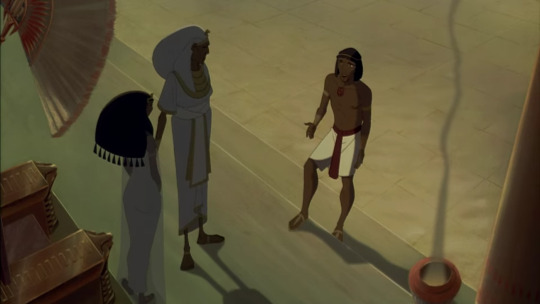
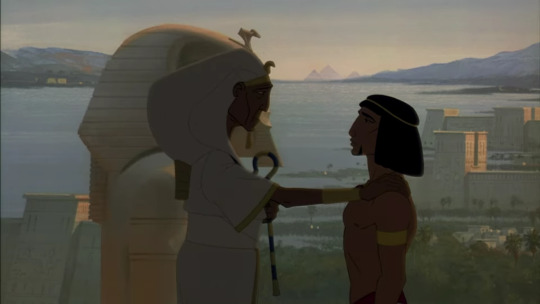
He is seen reaching out to him, breaking the barrier. We’ll later find out that the king listened to Moses’ suggestion to approve of Ramses, which further drives the point.
The whole case of Ramses as a weak successor and Moses as a supportive brother almost made me think they are a loving, blue-blooded family. We see here how the Egyptians are so far in viewing the oppression they’re committing to the Hebrew people.
The king required them to attend a banquet where Ramses is going to be appointed as crown regent. He is offered a gift by the high priests: a woman from a faraway land. However, she’s feisty and fights back when the princes try to ridicule her. Moses played the game right, or so he thought. When he gazed at his mother, thinking she’d approve of the mockery, he saw her shake her head in disappointment. (Again, women!)
Ramses gave Moses his ring as he appointed his brother as royal chief architect. He now has an actual place in the palace, not just a brother to the crown prince.
Moses pursued the woman they mocked earlier, and found out she was able to escape. He could’ve used his privilege as prince to imprison her again, but for some reason, he used that to her advantage instead.
Moses let her get out of the palace, and followed her to the streets. He’s pleased with what he did.
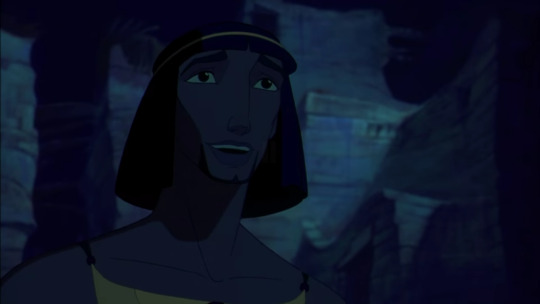
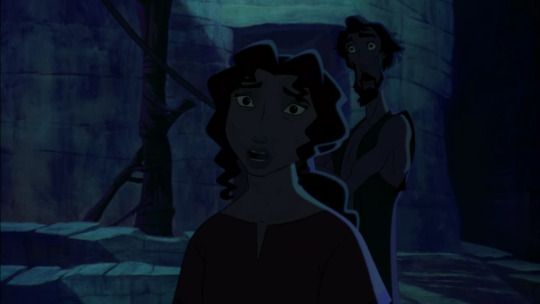
Even the dialogues from this movie are written beautifully. This exchange is cleverly worded, knowing that the Pharaoh is considered god in Egypt. Miriam’s answer can be interpreted as either he's supposed to ask God or his alleged adoptive father of his origins.
Miriam: Our mother set you adrift in a basket to save your life!
Young Moses: Save my life? From who?
Miriam: Ask the man that you call "Father."
He didn’t take offense earlier when he’s called an “arrogant pampered palace brat”, maybe because he knows it’s actually true? Maybe because no matter how rude he seems to be, the important thing is he’s still royal in her statement? We saw how a place in aristocracy gives him validation. Miriam’s declaration of him being an illegitimate Egyptian is no forgiving matter.
This is possibly my only negative remark on this movie: The part where Miriam sings a lullaby is not explained well. It wasn’t stated in the film but, in the Bible, the princess hired Jochebed to take care of Moses. He probably remembered that lullaby.
Another brilliant visual! A mirror of earlier close-up with Jochebed:
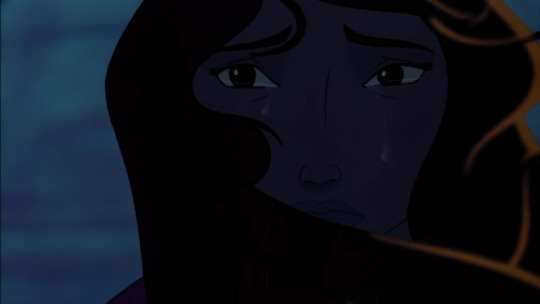
Moses runs back to the palace, trying to convince himself that “this is all he ever wanted,” but he’s dissatisfied with it.
An illustration of what transpired that day was laid out next using hieroglyphs. This may just be a dream or an illusion, but this is the first time that we witness Moses acknowledging them. I think he has always known the hieroglyphs are telling him the ugly truth, but chooses to ignore. After waking up to that nightmare, he runs off to the drawings on the wall.
We've seen this earlier. There’s that familiar person pointing at something, but it was limited and shown from Ramses’ perspective. Moses chose to see the big picture. He’s perfectly placed here, too, with him lined up with the newborns. The truth is: He could've been one of them.
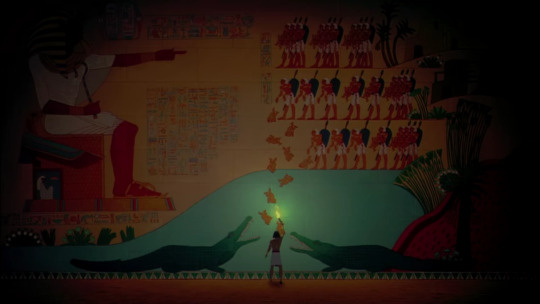
I wonder if the Pharaoh knew he’s a Hebrew. Didn’t his father wonder if Moses would rebel one day? We see the king trying to comfort him. Moses discovers he’s well aware of his vile ways.
“Sometimes, for the greater good, sacrifices must be made.”
Moses, after hearing this, felt horror at the thought that the sacrifices his father meant were innocent children (to which he belonged). The sentence below was said in a very comforting father tone.
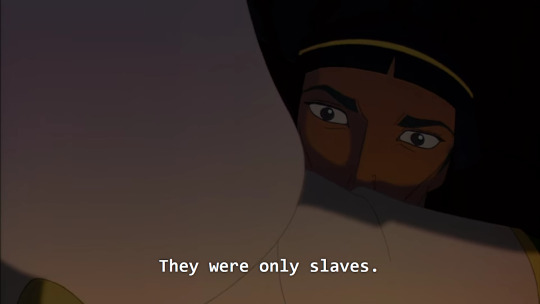
Young Moses: Why did you choose me?
Queen Taya: We didn't, Moses. The gods did. This is your home, my son, here the river brought you, and it's here the river meant to be your home. Now you know the truth, love. Now forget and be content, when the gods send you a blessing, you don't ask why it was sent.
Horrible words uttered as a song is worse because they sound comforting and beautiful to hear. Despite this, Moses was still able to spot the errancy.
...continued here in Part 2.
2 notes
·
View notes
Text
The Contendings of History and Seth
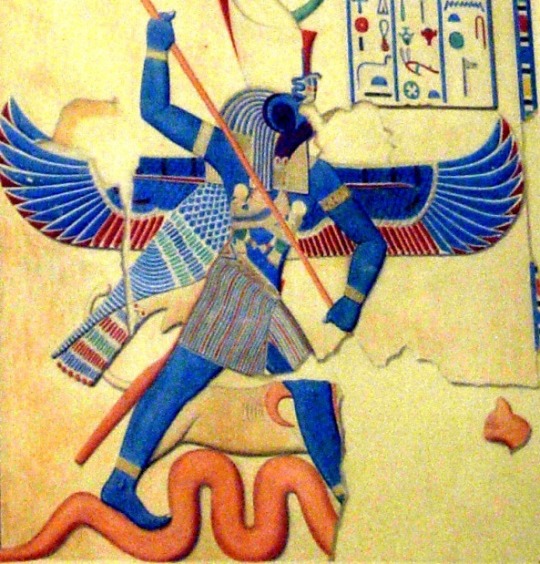
Seth as a serpent-slayer (MET) It's safe to say that the myth of Osiris is one of the only non-Greek myths to enjoy a comparable degree of recognition in modern popculture. There are few direct adaptations, sure, but the core narrative is well known, and as a result works themed after ancient Egypt use Seth as a villain almost without fail if only the premise allows the use of fantastical elements. However, in this article I will instead examine the other side of Seth, and especially his role as a protagonist of myths in his own right, including the historical circumstances of this development. While I mostly want to introduce you to a little known but fascinating world of heroic(?) portrayals of Seth, naturally I will also cover Seth's later loss of relevance and complete vilification to explain why it survived as the dominant tradition.
Early history of Seth
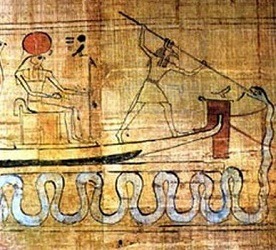
Seth protecting Ra from Apep (wikimedia commons) From the dawn of recorded history Seth's status in Egyptian religion was ambivalent, and it continues to be a topic of heated debate among researchers what degree of popularity he enjoyed in particular very early on. Some aspects of Seth character, like his evident interest in both men and women and whether it reflects broader Egyptian cultural norms (or if it’s merely yet another way in which Seth was an outsider among gods and men, as the author of the first monograph dealing with Seth proposed in the 1960s) are likewise a hotly debated topic. Seth was associated with many animals, such as the hippopotamus and the crocodile, but his main symbol is the sha or “Seth animal” which is regarded as either a mystery or a fictional creation, and in Egyptian texts inhabits zones inhospitable to humans. Seth was called “the god of confusion” by Herman Te Velde (the first writer to dedicate a monograph to him) and while this opinion has been since called into question, it is undeniable that it’s hard to form a coherent image of him. In addition to various versions of the well known myth mentioned above there are other instances of combat between Seth and Horus (most likely initially a distinct myth combined with the narrative about Osiris’ death and resurrection at a later date) and of Seth as a menace to the established order. Some of the Pyramid Texts present even the human followers of Seth as enemies to be conquered (which is held by some researchers a mythical memory of strife between local kings before the unification of Egypt). . However, there are also texts where Seth is a rightful member of the Ennead; where he and Horus act in harmony as protectors of the ruler; where he assists pharaohs in their resurrection in the afterlife; and even to Seth as one of the gods responsible for returning Osiris to life. A recurring motif in texts dealing with the afterlife in particular is a description of Seth offering a ladder to the dead who can reach some destination themselves. Mentuhotep II of the XI dynasty seemingly had Seth and Hathor depicted behind his throne in art; Hatshepsut described Seth positively as well. Personal names invoking Seth are known, too; and as established by Willam Berg in his studies of a different ambivalent deity, “children are not called after spooks.” Seth's ambiguous character made him ideal to represent The Other in Egyptian culture – the foreigners, especially these arriving from the Levant, their culture, and generally “un-Egyptian” traits. In that capacity, he functioned as an “ambassador” or “minister of foreign affairs,” to put it in modern terms. Or perhaps a foreigner in his own country, so to speak. As a result, he came to be associated with a group of deities which, while part of the official pantheon, had their origin outside Egypt.
The Ramessides and foreign gods
Generally speaking, there were two primary sources for foreign deities incorporated into Egyptian religion: Levantine trade centers like Gebal (Byblos in Lebanon) or Ugarit (Ras Shamra in Syria); and Egypt's vassal/enemy/ally/very occasional ruler Nubia (roughly corresponding to present day Sudan). Libyan influence was smaller, and to my knowledge there is no evidence of any major impact of Egypt's other trading partners (Punt, located near Horn of Africa, and Minoan Crete; the latter absorbed many Egyptian influences instead, though) or enemies (like the Hittites) on religion. The peculiar history of Seth is related to the the first of these areas. Early researchers saw the “Syrian” deities as worshiped at best by slaves or mercenaries – they didn't fit neatly into the image of Egypt presented by some royal inscriptions: an unmovable, unchanging and homogeneous country, a vision as appealing to absolute rulers in the bronze age as it was to many 19th and 20th century researchers. However, the truth was much more complex, and in fact some of the best preserved accounts of foreign cults in Egypt indicate that the process was in no small part related to the pharaohs themselves. For example Ramses II in particular was an enthusiast of Anat, as evidenced by statues he left behind:
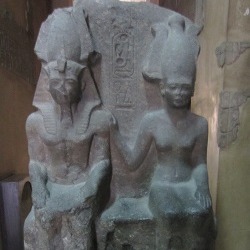
Ramses II and Anat (wikimedia commons) He also named his daughter Bint-Anat (“daughter of Anat”) and his favorite pets and possessions bore Anat-derived names too. Not only only Ramses II himself, but the entire XIXth dynasty – the “Ramessides” (a term also applied to the XXth dynasty) - was particularly keen on these imported deities. Curiously, one of its founders was named Seti - “man of Seth,” and Seth was seemingly the tutelary deity of his family. The well known case of Ramses II's red hair might be connected to this – this uncommon trait was associated with Seth. As a result of the Ramessides' rise to power Seth became one of the state gods in Egypt, alongside heavyweights like Amun, Ptah or Ra. However, it's also safe to say that he was popular in everyday cult among commoners, as evidenced by finds from camps for workers partaking in various construction projects.
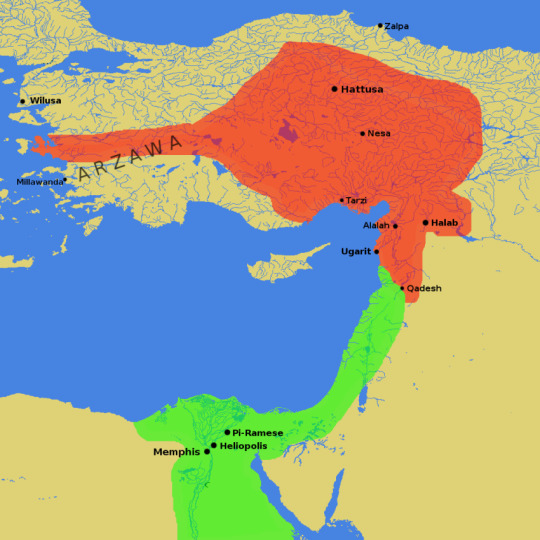
Part of Egypt of the Ramessides at its maximal extent (in green; wikimedia commons) During the discussed period, Egypt was as the peak of its power, both military and cultural; the “other” recognized Egypt's power. Weaker states in the proximity of Egypt paid tribute, while the more distant fellow “superpowers”of the era (the Hittites and the Mitanni, rivals of Egypt in Syria and the Levant, and the more distant Kassite Babylon) bargained with Egypt for dynastic marriages, luxury goods or craftsmen. While some foreign rulers didn't necessarily get that the pharaohs might not want to play by their rules and expressed frustration with that in their letters sometimes (see a particularly funny example below), overall the relations were positive, and resulted in a lot of interchange between cultures.

(source) The incorporation of foreign deities into Egyptian pantheon was a phenomenon distinct both from the well known practice of interpretatio graeca and from the monumental Mesopotamian god lists, and foreign gods were adopted rather selectively. Some researchers propose that the incorporated deities were often chosen because their sphere of influence wasn't covered by any native god. For example, Astarte (more accurately Ashtart or Athtart, considering the Ugaritic orthography; however the Greek spelling is used in literature to refer to the Egyptian version and I'll stick to that) was associated with horses and chariot warfare. As the animal wasn't known in Egypt in the formative period of the state, it wasn't among the symbols of any local deity; at the same time chariots were a prominent component of the Egyptian military at the height of its power, and as such required a deity to be put in charge of it. Six deities of broadly “Syrian” origin are usually listed among Egyptian gods in modern scholarly literature: Anat, Astarte, Resheph, Houron, Baal (the Ugaritic weather controlling one) and Qadesh. Of these, four were pretty similar to their original versions. Qadesh is a complex case as it's uncertain if such a deity existed outside Egypt – it's possible she developed as a combination of a divine title (“the holy one”) and the general Egyptian perception of foreign religion. Some scholars in the past asserted she is simply Athirat/Asherah but this interpretation relied on the false premise of Athirat forming a trinity with Anat and Ashtart and the three of them being the only prominent goddesses in cities like Ugarit. There are also curiosities like Chaitau, a god with Egyptian name (“he who appears burning”) but attested only in sources from Levantine cities (though ones written in hieroglyphics) and in magical formulas of similar origin. Baal is the most puzzling case: simply put, it's clear Baal was introduced to Egypt. It's clear Baal was depicted in Egyptian art. It's even clear that Egyptians knew that Anat and Astarte were deities from Baal's circle back at home, and that Baal was tied to a narrative about combat with the sea. And yet, it's not easy to say where the Egyptian reception of Baal ends and where Seth starts. Baal's name was even written with the Seth animal symbol as determinative. When exactly did this identification first occur is unknown: while it would be sensible to assume the Hyksos, a Canaanite group which settled in Egypt and briefly ruled the Nile delta, are responsible, there is some evidence which might indicate this already happened before.
Baal and Seth
Baal was a natural match for Seth: Seth represented the foreigners, Baal was the most popular god of the foreign group most keen on settling in Egypt; Baal has a somewhat unruly character in myths; both rule over storms and have a pronounced warrior character. Additionally, both of them were depicted as enemies of monstrous serpents. Baal was identified with Seth in Egypt, but in turn Seth became more Baal-like too. So-called “Stela of year 400” depicts an entity labeled as Seth more similar in appearance to Baal due to the human face and Levantine, rather than Egyptian, garb:
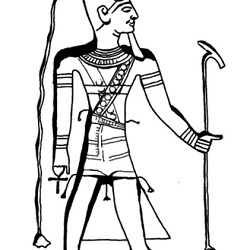
(source) It is well known that the main myth of Baal, in Ugarit the first part of the “Baal cycle,”describes his combat with the sea, personified by the god Yam, seemingly described both as humanoid and serpentine. In Egypt, this narrative was associated with the composite Seth-Baal, and a fragmentary version is recorded in the so-called Astarte papyrus. Curiously, it was actually discovered long before the Baal cycle itself – however, it only became a subject of in depth studies in the wake of the discovery of Ugarit. There are also many similarities to the Hurrian myth “Song of the Sea,” known only from fragments, and to the Song of Hedammu from Hittite archives. While in the Ugaritic version Baal fought the personified Sea against the wishes of the head god El, in the Egyptian version the confrontation happens because the Ennead fears Yam, who threatens to flood the earth and demands tribute, much like the Hurrian Sea. Before Seth properly enters the scene, we learn about how Ptah and Renenutet, a harvest goddess, appeal to his associate Astarte (as already noted before viewed as Ptah's daughter in Egypt), hoping she'll act as a tribute bearer. Astarte is described as a fearsome warrior; however, she is not meant to fight Yam herself, but merely temporarily placate him. She seemingly strips down and brings offerings – this is, once again, closer to the Hurrian than Ugaritic version, where Shaushka, an “Ishtar type” goddess like Astarte, seduces the sea monster Hedammu in a similar way. It is not clear if Yam is interested, though - in fact he appears to question why Astarte isn’t dressed (possibly mocking what must’ve been a humiliating situation for a warrior deity, I’d assume). Eventually, Seth arrives and presumably fights Yam, likely with Astarte's help - the rest of the papyrus is too poorly preserved to decipher, but as indicated by the foreign equivalents Seth and Astarte win. This is confirmed by the Hearst Medical Papyrus, imploring Seth to expel illness from the treated person just like he vanquished the personified Sea. The Ugaritic version of the myth doesn’t include a tribute scene among surviving fragments, though it’s worth pointing out that the Ugaritic Ashtart/Astarte cheers on Baal during his battle against Yam and berates him for not acting quick enough, which is easy to interpret as hostility caused by a similar episode. Many researches assume that it existed among the lost fragments of the Baal Cycle tablets, though this is for now purely speculative. A variant of the myth of Seth and Horus - The Contendings of Horus and Seth - presents a further curious case of Seth-Baal syncretism, this time incorporated into well established Egyptian myth rather than an imported foreign one. Seth and Horus compete for the right to rule after Osiris' death. Ra thinks Seth is the better option to nominate as a successor because Seth killed Apophis on his behalf, but a few other of the elder gods disagree and try to delay the process by insisting to ask various deities to provide their expert opinions. These generally favor Horus much to Ra's annoyance, but he can't go against them so he insults Horus (calling him "feeble and weak-limbed" and criticizing his hygiene) but doesn't stop his rise to power. The semi-humorous portrayal of Ra is rather unusual; in addition to showing annoyance with other gods, at one point he vanishes, and only agrees to return because Hathor lured him out. It seems Horus' mother Isis insults Seth in response to Ra's comments. Seth, offended, refuses to partake in the divine assembly unless Isis leaves; Ra orders that and the gods gather again without her. However, Isis disguises herself and asks Seth who should inherit first, a child or a brother who can provide for himself (and is a foreigner), to which Seth replies that the former; this was a trick, obviously, and Isis holds it as proof that Seth forfeited his right to rule, which Ra accepts. After multiple chaotic tribulations (including the [in]famous lettuce episode as well as Horus decapitating his mother because he decides she doesn't do enough) Horus is re-declared king but Ra, implored by Ptah (otherwise absent from the myth) gives Seth two wives (eg. Anat and Astarte; this solution was suggested already earlier by the gods providing the opinion; some authors question if they are meant to be Seth’s wives or merely allies, much like the relationship between Baal, Anat and Ashtart in Ugarit is considered debatable) and the storm clouds as his new domain. He is to strike fear into hearts of men, but will also get to be treated as if he were Ra's own son. Considering the emphasis on storm and the mention of Anat and Astarte, it's pretty clear to me that Egyptians essentially invented their own Baal backstory meant to integrate the foreign tradition with their own by recasting Baal and Seth as the same entity. The text is however unusual because of its humorous tone – the gods insult each other, act ineptly and all around hardly provide an inspiring example. Perhaps the focus on Seth made this possible. As a final note before I'll move on to times much less prosperous for Seth it's worth to mention that not only Baal but also other foreign gods were at times equated with Seth. The Libyan god Ash was conflated with him in the western oases, while treaties with the Hittites assign the name of Seth to various members of their pantheon, including the Baal-like Tarhunna (equivalent of Hurrian Teshub) but also the sun goddess of Arinna.
Demonization of Seth
While in the late bronze age Seth greatly benefited from his role as a god of foreigners, in later periods this has proven to be his undoing. Egypt couldn't maintain its power forever, and eventually fell to the Assyrians, who showed little respect for local culture and looted Thebes. While the Assyrian domination was only temporary, it severely damaged the country, and a spiritual scapegoat was needed to reconcile the carnage with the idea that Egypt was a land chosen and protected by the gods. The change seemingly occurred under the rule of Psamtik – in a new version of the myth of Seth and Horus, Seth not only lost decisively, but also was punished afterwards, and religious texts spoke of a “rebellion”of Seth. Seth was never associated with Ashur, the head god of the Assyrians, before, but in Egyptian imagination he was blamed for bringing the invaders under “his” command to ravage and subjugate the country. A mythical text has Isis implore Ra to punish Seth for robbing temples, much like the Assyrian armies did. Even later accounts tell various tales about Seth being punished, either gruesomely (a few texts recount massacred of towns belonging to Seth) or humorously (for example in one text Thoth makes him impotent with a spell) and exiled from among gods. There's evidence that the worship of Seth, previously commonplace, came to be abhorred and depictions of Seth were destroyed or altered. A famous example is a Seth statue converted to look like Knhnum or Amun instead:
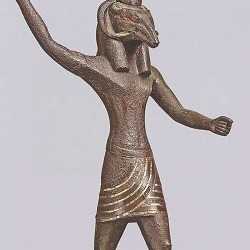
Seth no more (wikimedia commons) A late relief from Edfu, from the Ptolemaic times, seems to indicate that even Seth's role as a guardian of the solar barge was lost: Seth, depicted as a hippopotamus, was defeated by Horus from the solar barge of Re. However, while Apep is usually depicted as huge and menacing, hippo Seth is tiny and pathetic.
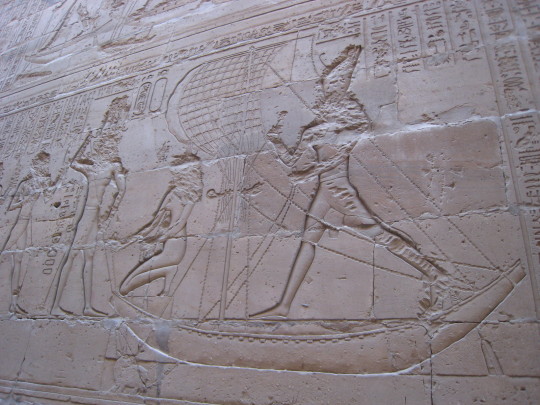
Seth as a tiny hippo representing the forces of chaos (wikimedia commons) Curiously, despite the official policies, which continued under Ptolemaic rule, it seems that until the 2nd century CE, Seth continued to be popular in the Dahkleh oasis, possibly even serving as the main deity there. Sadly due to lack of research I am unable to provide any more detailed information about that.
Closing remarks
Even further demonization of Seth is evident in the fact that the Greeks and Romans referred to Seth as Typhon, leaving no room for ambiguity of interpretation. As the Greek accounts of the late version of Seth were all that was known for centuries due to ability to read hieroglyphic writing vanishing with the advent of new religions, it remains dominant in media today. Perhaps it would be beneficial to leave some room for the serpent-slaying hero Seth hanging out with foreign deities in modern works, though? Surely his peculiar outsider status is even more appealing to modern readers than it was to the public of the Ramesside period.
Bibliography
N. Ayali-Darshan, The Other Version of the Story of the Storm-god’s Combat with the Sea in the Light of Egyptian, Ugaritic, and Hurro-Hittite Texts
G. Beckman, Foreigners in the Ancient Near East
M. Dijkstra, Ishtar seduces the Sea-serpent. A New Join in the Epic of Hedammu (KUB 36, 56+95) and its meaning for the battle between Baal and Yam in Ugaritic Tradition
T. J. Lewis, ʿAthtartu’s Incantations and the Use of Divine Names as Weapons
D. Schorsch and M. T. Wypyski, Seth, "Figure of Mystery"
D. T. Sugimoto (ed.), Transformation of a Goddess. Ishtar – Astarte – Aphrodite - especially the chapters ‘Athtart in Late Bronze Age Syrian Texts by M. S. Smith and Astarte in New Kingdom Egypt: Reconsideration of Her Role and Function by K. Tazawa
H. Te Velde, Seth, God of Confusion: A Study of His Role in Egyptian Mythology and Religion
P. J. Turner, Seth - a misrepresented god in the Ancient Egyptian pantheon? (PhD thesis)
C. Zivie-Coche, Foreign Deities in Egypt
128 notes
·
View notes
Text
All Ye Mighty - Chapter 1
[ WHOO ADRIAN FIC MY BELOVED, I STARTED ONE A YEAR AGO AND NEVER GOT ANYWHERE BUT I'VE GOT THIS NOW ]
First || Next || Previous || Last
[ Ao3 Link ]
“What do you mean I should become a masked vigilante? Do you know how often I’d get my ass kicked?”
Florian, at this point, was used to the masks that now populated New York, having seen them all over the news and in person a few times. He’d openly admit that his favourite was Mothman- he always liked the idea of flying.
He was not, however, used to his friends suggesting he should become one.
The reason why was obvious: his “gift”. He wasn’t born with it, as far as he was aware, but something did trigger it in his childhood. It was simple, he didn’t really have much control over it, certainly not enough to start fighting with it.
‘Telekinesis’, the doctors called it. Rare, but not totally unheard of. Usually formed at birth or through trauma. Decidedly, according to his therapist, it was trauma.
It didn’t bother him much, like it did other people with the condition. It helped around the house, that was for sure. Plus it was a great party trick.
But, a lot of people thought he should be using it for more.
He knew better than that though. Every time he even considered it, he was reminded that he couldn’t control it when he woke from a nightmare and found his nightstand a foot off the ground, or the floor length mirror in the corner of his room shattered.
Heroism simply wasn’t feasible, he would much rather leave it to the professionals and law enforcement.
And he told his friends that. Always reminded them that he couldn’t control it and, even if he could, he wasn’t strong enough for something like that. He didn’t know how to fight, he could hardly take a joking punch without bruising, and his low iron made him bleed easily.
Plus, he was still in the binding stage. There was no way he’d be able to fight in a binder without hurting himself, and he didn’t want to be labelled as a woman if a reporter ever caught sight of his chest.
Funnily enough, one of his friends retaliated to that by making him a suit that made his gender unclear, which meant that- paired with his deeper voice thanks to HRT- would make people automatically assume he was a man.
That didn’t suddenly convince him though, but he did keep the costume in the back of his closet, as a ‘just in case’ kind of thing.
Really, the only reason he ended up changing his mind was because he got mugged on his way home one day, and very quickly realized that he genuinely had no idea how to defend himself.
He still wasn’t sure if his attacker survived when he threw out his arms and sent them flying back. He heard the crack when they hit the wall behind them, and saw the blood that adorned the brick when they slumped to the side.
Not wanting to deal with explaining that it was self defense, he ran. And when he got home, he started looking for a place to learn how to fight.
His friends, while they knew he was taking self defense classes, didn’t know why. They didn’t get to know his plan, not when he knew they wouldn’t be able to keep his mouth shut. Besides, them knowing who he was was dangerous. If he made enemies and they knew about his friends, he couldn’t imagine what they’d do.
So he kept it from them. It wasn’t hard, he’d been lying about not remembering his past since before he knew them. It was practically second nature at this point.
By the time he could defend himself well enough to put on the mask, a man called Ozymandias made his debut.
His golden armour was, admittedly, a little gaudy, but the purple cape worked well with it. If Florian had to guess, he’d say the whole aesthetic was a tribute to a handful of historical figures- Alexander the Great and Ramses II (otherwise known as Ozymandias), it seemed.
Good, maybe he’d be able to get along with one of the masks when he made his own debut; a fellow history buff seemed like a likely friend. Or, at the very least, a partner to work with.
He waited about a week before making his own debut, not wanting to take any attention away from Ozymandias right after he introduced himself to the city.
Since his first ‘mission’ was a fire- one that was very easy for him to put out, as he learned that his telekinesis could easily pass as pyrokinesis- the papers took to calling him ‘Brigade’, like a fire brigade. It fit. He liked it.
He was quick to make a name for himself, focusing on things he knew he could do well. Putting out fires, taking down the occasional small time criminal or mugger. One time, he even pulled a cat from a tree, and very quickly became a running joke amongst the people who considered masks to be insane.
His reputation quickly became that of a weak but generally kinder mask. He’d yet to kill a criminal, hardly even beat them up past what was needed to tie them up. Hell, he’d even managed to talk a bank robber down once without even touching them.
It was about a month or two into his new side job that he actually met Ozymandias, and at a gala-like event no less. He hadn’t felt entirely comfortable showing up to an event like this, especially since he was supposed to show up in costume (and did), but he could handle it.
Ozymandias was the one to approach him, simply giving him a gentle smile when he almost jumped out of his skin at a sudden hand on his shoulder, sending a nearby chair flying into a wall.
That was enough to get him to grab the fellow mask’s hand and drag him away from the scene, unwilling to explain what happened.
“Leading me away already? Why, Brigade, you’ll give the media all kinds of ideas.” Ozymandias teased, making him freeze in his tracks. Decidedly, this was a good place to stop. He was extremely happy for the fact that his mask covered the top half of his face, because the blush on his cheeks was going to kill him.
Once he was over that, he realized he’d never heard Ozymandias’s voice before. He furrowed his eyebrows, quickly placing what he thought his accent was. “German?” he asked softly, talking more to himself than anyone else.
He looked up when he heard a low hum. “You’ve got good ears. Do you always guess accents when you meet someone new?”
Ah. He could feel his face flush again. “Oh-! No, no I don’t. Or, I try not to. I’m just- talking makes me less nervous, so I vocalize my thoughts in places like this. Sorry.” He heard a soft chuckle, and quickly realized that Ozymandias wasn’t upset like he thought.
“Well, no matter your nerves, I’m glad to finally get you alone. I’m curious, why is it that you stay away from things that would give you more publicity? I think the worst person I’ve seen you go against was that… Captain Carnage?”
Florian cringed at the mention of Captain Carnage, remembering all too well how he begged to be beat up. He’d pretty much just thrown him a bone when he sent him flying far away from him, and then had to deal with him for the rest of the day until The Comedian showed up and kicked his ass.
He still appreciated the Comedian for that, even if he’d never thank him (apparently, showing him any sort of kindness either made him assume you wanted to fuck him or that you wanted to fight him).
Finally, he realized he’d yet to respond to the question. “Oh, uh, I just know my limits. I’m not a very good fighter, I very much rely on catching people off guard and keeping them moving until they tire out.”
Ozymandias hummed at that, bringing a hand up to lightly tap his chin as he observed Florian. “How would you like to work together? We can be partners. I believe it’d be good for you to have someone watching your back. You never know the kind of trouble you could get into.”
Oh god, that was basically an invitation to get into that kind of trouble!
Of course he took it. He thought Ozymandias was hot.
“Well, I guess you’ve got yourself a partner now,” Florian replied, smiling as he shook Ozymandias’s hand, making it official.
He really couldn’t have imagined the domino effect that would have.
#story tag: all ye mighty#self ship#self ship fic#self shipping#jack.writing#jack.ships#s/i: florian holcomb#adrian veidt#romantic: 👁👑#chapter 1
3 notes
·
View notes
Text
Eye-patch Chats
“So,” said Buddy, “Are there any questions about the plan?”
Juno tried to ignore the way she directed her gaze at him as she spoke, waiting for him to ask her to repeat herself. Sure, back when he was still adjusting to life on the Carte Blanche he’d asked some stupid questions, but plenty of time had passed since then and he was practically a seasoned criminal by now.
Ok, well, there was that one time last week when he’d forgotten what their objective was, but that was a complicated heist! And of course the time before that when he’d nearly overslept their departure…
Alright, fine, maybe this didn’t come naturally to him the way it did Buddy or Vespa or Jet or Nureyev or even Rita (honesty had she been running a side hussle the entire time she was his assistant?), but this time he understood her plot perfectly. He would not be supplying the kind of dumb comment she was expecting.
Except… he did have a question.
After a moment of silence as Buddy waited for his inevitable interjection, he gave in. At least this time he wouldn’t be asking about simple logistics that everyone else at the table seemed to understand already.
“I know the whole attire thing is your deal, Buddy,” he began, thinking back to their first mission when Buddy had put him a gaudy golden gown. She’d been right, though, he fit in perfectly, not that objecting got him anywhere anyways. “But, I was hoping we might skip the glass eye, considering last time I used a replacement I almost died getting rid of it-- no offense Big Guy.”
Jet shook his head. “No, you are correct. I did not anticipate your survival.”
“Well, isn’t that a vote of confidence,” Juno muttered.
“Oh, you should see him before getting a shot!” Rita interjected. “He gets all pale and grumpy and starts grumblin’ about how he can’t stand blood even though he was a detective and worked a bunch of murder cases and I always had to say ‘Mistah Steel, you get out of that windowsill right now and march on over to the doctor’s office--’”
“Alright, that’s enough of that!” he said, shooting her a look.
“Actually, I think we should recreate that scene,” added Vespa in a tone that made Juno very uncomfortable with the fact she was the only medic on the ship.
“That would be very humorous,” said Jet.
Before anyone else could jump on the ‘embarrass Juno’ train he decided to redirect the conversation to the topic at hand. “So is that a yes or no on the glass eye?”
Buddy considered for a moment before nodding. “I don’t foresee that causing any issues, although if it comes down to a matter of safety--”
“I’ll suck it up and wear the thing,” he finished for her. “Is there anything else or can we call it a day-- not that this whole conversation hasn’t been a complete joy.”
He glanced around the table at the others. Vespa was still smirking, proud of her contribution, while Rita seemed to be playing an intense game of charades with Jet that was either a continuation of their earlier conversation or a reenactment of a star combusting. To his surprise, Nureyev, sitting at his right, was silent. Sure, it wasn’t like him to jump headfirst into conversations like this, but he usually had a comment on the plan, at the very least.
Instead, his expression was blank. If Juno hadn’t known him so well he might have mistaken it for boredom, but experience told him that was the face Nureyev put on when he was lost in thought.
He’d have to ask if everything was alright once they had a free moment. Chances were he was just breaking down the next heist, plotting his own movements within what Buddy had already determined. Still, an unease settled in him.
“Yes, that’s all for today’s family meeting, “Buddy answered, pulling Juno from his thoughts. “I expect you each to spend the remainder of your day preparing.”
With that, she stood up and the table picked up it’s individual conversations.
He was about to use the cover of post-meeting chaos to ask Nureyev if he was alright, but was interrupted before he got the chance.
“Mistah Steel,” Rita said, having abandoned the game of violent gestures with Jet, “Why don’t I go ahead and fix that tracker in you comms. Sounds like you're going to need it for the big mission tomorrow.”
“Huh?” he said, his attention shifting over to Rita. “Oh, yeah, the tracker. Sure thing Rita just give me one sec--”
Looking back at where Nureyev had been he found that the thief had made one of his signature escapes while Juno had been distracted. It seemed that their conversation would have to wait until later.
Rita was staring at him with a curious look on her face as he returned to their exchange.
“Uh, here you go,” he said, fishing his comms out of his pocket. “Actually, I was wondering if you could show me how the tracker feature works. If it breaks on a job again I can’t necessarily rely on you to be there to fix it for me.”
“Are you sure, Mistah Steel?” she asked, a hint of a smile creeping onto her face. “Last time you asked me to explain something technology related you spent an hour tryin’ to figure out where the power button was-- and that’s not even counting the time ya spent claimin’ the screen was broken.”
“Well I’m still not convinced it wasn’t broken, but that’s beside the point,” he argued. Stupid computers and their stupid controls… “Anyways, can you just show me how the thing works.”
“If you insist,” Rita said with a shrug, “We should probably go to my room though, it’s pretty busy out here and I’ve got a hunch this’ll take a while…”
His eyebrows pulled together as he frowned.
“I won’t take that long,” he retorted, though he followed her to her rooms anyway.
***
It took the entire afternoon and a large portion of the evening to fix the tracker. Well, it took Rita ten minutes to do it and another hour to explain how. The rest of the time was dedicated to his attempts to repeat what she’d done and breaking the thing even worse than before.
At the end of the day they were both exhausted and Juno was nowhere closer to understanding how his comms worked. Hungry and brain dead, they’d decided to call it a day and grab a late dinner.
It wasn’t until he was about to retire to his room for the night that he actually had a chance to look at his comms. As Rita had not so subtly pointed out, he wasn’t exactly an expert when it came to technology, so he wasn’t particularly accustomed to receiving messages, especially now that most of the people who had any interest in speaking to him lived on the same ship.
As he flopped onto his bed, prepared to all but pass out, he decided to double check his inbox, just to be sure.
It was a surprise to find a question from Nureyev.
“Can we talk?” it read, short and sweet, which only made his stomach drop.
It was probably nothing, and yet… well that sure was a comforting message to receive from your ex-something.
It’d been sent around noon. As much as Juno wanted to crawl into bed and forget about his growing dread long enough to fall asleep, he couldn’t let Nureyev wait any longer in good conscience.
So, somehow he found himself trekking across the Carte Blanche in the middle of the night, the day before a mission. It didn’t occur to him until after he’d knocked on the door that Nureyev was probably already asleep.
He was just about to make a shameful retreat when the door swung open.
Nureyev, it seemed, was still wide awake. In fact, the other man was still dressed in the clothes he was wearing earlier that day, which made Juno a bit embarrassed of the T-shirt he slept in.
“Uh,” he began, noticing the quizzical look on Nureyev’s face. “I got your message”
Before he could get a response, though, he followed up his own statement with apologetic word vomit. “I just realized how late it is, though, and you probably have a ton you want to get done before tomorrow so I should go, right? Yeah I should go--”
He tried not to physically cringe at how awkward he sounded. Jeez, he was acting like Rita, but at least she made it charming.
But Nureyev only smiled in that easy way he did and motioned Juno inside. “Not at all. I’ll be up for another few hours anyway and all my preparations for tomorrow are complete. Please, come in.”
Juno obliged with an embarrassed nod. Nureyev followed him inside the door shutting behind him with a soft click.
“So I got your message,” he started again, rubbing the back of his neck when he realized he’d already said that. “I guess… I guess I just wanted to make sure you were alright. You were kind of out of it earlier today.”
At that, Nureyev laughed and shook his head. If Juno hadn’t been so drunk on the sound of that laugh he might have worried he was being mocked, but Peter had a way of easing tensions without saying anything at all. Or, at least he did when it came to Juno.
“I could have asked you the same thing,” he answered, matter-of-factly. “Have a seat, Juno.”
Juno did, settling into the edge of Nureyev’s cot. The other man took the space next to him.
“I suppose I was simply curious,” he continued with a shrug. “I may have no right to ask this of you considering how tight lipped I’ve been about my activities last year, but what were you all referring to this morning?”
Juno’s brows furrowed as he thought back to that day’s meeting.
“I thought you already knew I hated blood?”
Nureyev smiled again. “Yes, I do recall that-- although Rita’s recounts added more pizazz than you’ve ever let on. I was actually talking about the near death experience with Jet.”
Oh. Oh. He was talking about the THEIA incident.
“Again, you can tell me if I’m overstepping,” he added hastily. “You seemed quite open about it earlier but I don’t want to assume anything.”
Juno leaned back and turned his eyes to the ceiling. “No, no it’s ok. I was just… surprised.”
By which he meant he was shocked Nureyev cared how he’d spent the time they’d been apart. Maybe that was just his own guilt talking, though. He’d made the choice to stay on Mars-- everything that had happened with Ramses and THEIA was his cross to bear. He’d had the chance to get away, but he’d chosen not to-- telling Nureyev about it felt a bit like throwing that choice in his face.
But he’d asked, and Juno was tired of the awkwardness between them. If Nureyev wanted to know, then Juno would tell him all he could.
“I guess it’s just hard to know where to start,” he mused.
“Might I suggest the beginning?”
Juno laughed. “Yeah, that’ll work.”
It was a long story, but Nureyev was patient as Juno navigated through the last year. It felt a bit absurd saying it aloud. The person he’d been back then was something else entirely, so convinced his worth was determined by his aim or how many cases he solved.
There was something refreshing about how the memories had become distorted with time. It was proof things had changed, even if some topics were still sore. The image of Ramses dead in his office… the ghosts of his mother and brother… the fight for control against his own body. All of it still sent a chill up his spine, but he’d learned to let his past walk alongside him rather than keep him in place.
By the time he got to the end his eyelids were threatening to shut of their own accord, but he hoped his exhaustion wasn’t too obvious on his face.
“After that, Rita and I decided to leave Mars. I… I couldn’t fix the planet on my own but I knew if I stayed I would keep trying anyways,” he finished, purposely leaving out the part where his new life was interrupted by the presence of a man he’d never expected to see again… and was quite possibly still in love with.
“I see,” said Nureyev, speaking for the first time since Juno had begun, an intensity in his face Juno couldn’t quite name. “Juno, I’m so sorry.”
He looked at the other man with a sideways smile.
“Don’t be. I won’t say I’m glad it happened, because I’m not. It was really really shitty. But, y’know, I’m not proud of who I was back then, and I might still be that person if life hadn’t knocked some sense into me.”
“Yes,” Nureyev agreed. ‘Yes, I think I understand. You aren’t the same man as you were in the tomb. I must admit, I’m glad for that.”
Juno swallowed, a wave of doubt rushing over him. Nureyev was… glad he wasn’t the person he’d known. What did that mean? He was relieved to no longer be distracted? He was happy he had no reason to care for Juno anymore? Maybe he deserved it after leaving the way he did, but that was a bit harsh, wasn’t it? He’d just told Nureyev his life story and all he cared about was that whatever he’d been charmed by was gone.
Nureyev was looking at the floor now, but Juno had nothing more to fill the silence. To his surprise, however, Peter beat him to it.
“Back then, with Miasma and the bomb, we didn’t know it only affected martians. It’s comforting to know that, should a situation like that arise again, it would play out differently.”
Juno gaped at him. “Oh.”
So he wasn’t glad that Juno wasn’t the person he’d fallen for. Nureyev was just glad he wanted to live.
Unsure where to go with their conversation after that, Juno stood. “Well, it’s getting late, and now that you know the story behind my aversion to eye replacements, we should really get some rest before tomorrow.”
Following Juno’s lead, Nureyev got to his feet and moved to open the door for him. “Yes, of course. Good night, Juno.”
“G’night,” he answered as he crossed through the threshold. “--And Nureyev?”
“Hm?”
“Thank you.”
The other man shot him a confused look. “For what?”
Juno shrugged. “Take your pick.”
***
Despite their late night, the next day’s mission went off without a hitch. Well, if you considered getting chased by the local authorities “without a hitch”, which Juno did.
The next few days were rather quiet. Buddy still required family meetings each day, but since they were a ways out from their next heist the discussions were rather concise. Juno spent most of his days somewhat begrudgingly watching streams with Rita. Anything to pass the time, he supposed.
He hadn’t spoken to Nureyev since the night they’d discussed THEIA ordeal, but Juno didn’t push it. He still wasn’t positive what sort of terms they were on. If Nureyev wanted to talk to him, Juno figured he would reach out.
He did, however, come across a small piece of fabric he’d never seen before on his bedside table one morning. Upon closer inspection, it appeared to be an eyepatch-- a nice one, at that-- with a dahlia embroidered in gold on the front.
It didn’t have a gift tag or anything to reveal the identity of the sender aside for a scrap of scratch paper with a sentence scrawled across it.
“So you have something real to thank me for.”
#the first thing i write since quarantine and its sooo self indulgent#lit rally its just roasting juno and soft jupeter#maybe yall will like it tho#online school starts tomorrow so at least a got something out before then#jupeter#juno steel#peter nureyev#vespa ilkay#rita tpp#buddy aurinko#jet siquiliak#the penumbra podcast#tpp#tpp spoilers#kinda??#my writing
245 notes
·
View notes